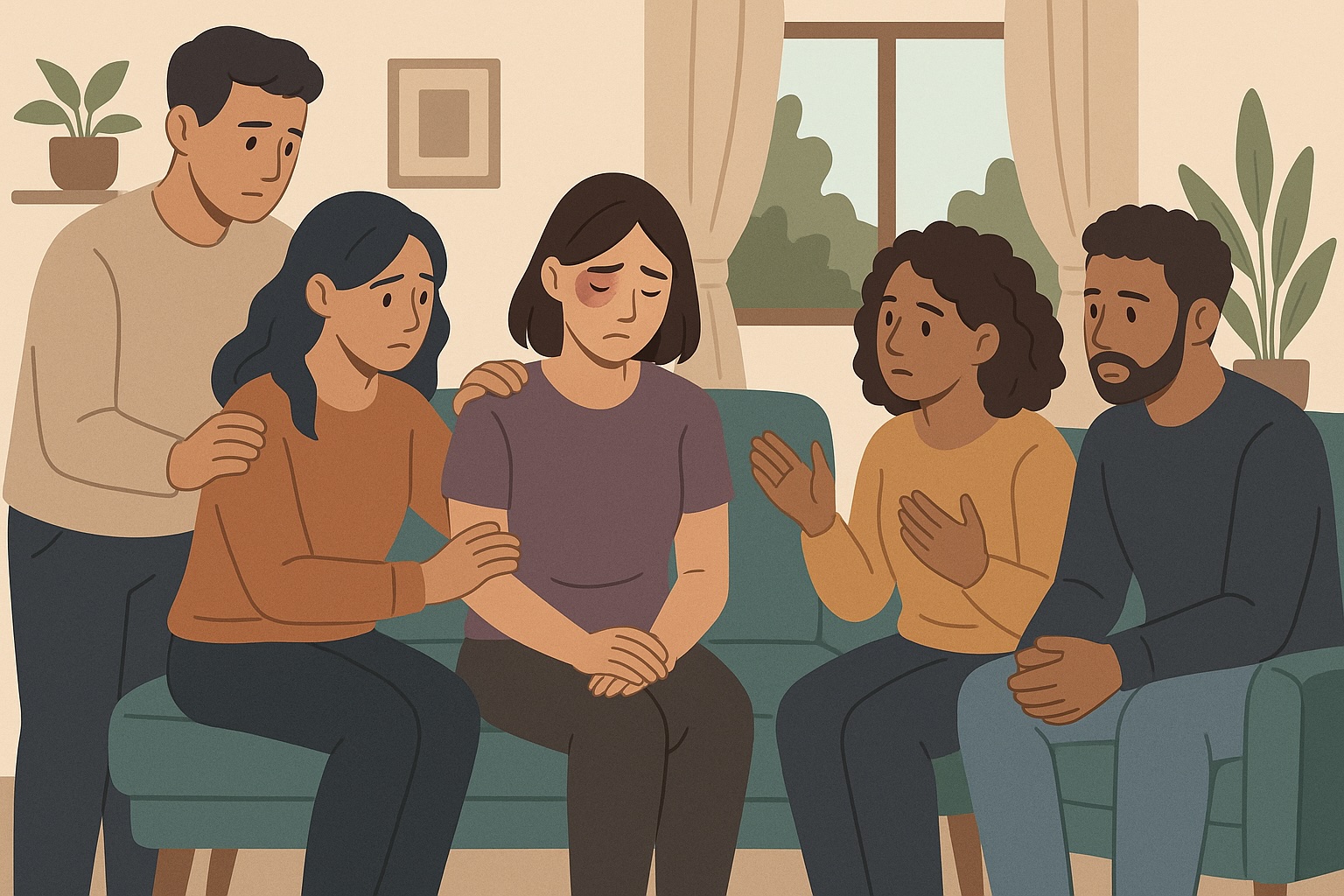How Family and Friends Can Support a Domestic Violence Survivor
Want to help someone in an abusive relationship but don’t know how? This guide for Ontario families and friends offers practical, non-judgmental ways to support a domestic violence survivor.

You suspect or know someone you care about is being abused. You want to help—but you’re afraid of saying the wrong thing or pushing too hard. Your support can be life-changing, even if it’s quiet and behind the scenes.
Here’s how to be there for a survivor—safely and effectively.
***
### 🧠 Understand the Nature of Abuse
* Abuse is about **power and control**, not anger or stress
* Survivors often stay due to **fear**, **financial dependence**, or **manipulation**
* Leaving is **not simple or always safe**—it’s a process, not an event
* Abusers often isolate survivors, making your presence even more vital
***
### 💬 What to Say (and Not Say)
* Say:
* “I believe you.”
* “You didn’t cause this.”
* “You’re not alone—I’m here for you.”
* “You have options, and I’ll help you explore them.”
* Avoid:
* “Just leave.”
* “Why didn’t you tell me sooner?”
* “I would never let that happen to me.”
* “It can’t be that bad.”
> Listening without judgment is more powerful than giving advice.
***
### 🤝 How to Offer Support
* **Stay in contact**—text, call, or check in consistently
* **Create a code word or signal** for emergencies
* Help them create a **safety plan** (without pressuring them to leave)
* Offer **childcare**, **transportation**, or a **safe place to stay**, if appropriate
* Keep their **information private** and never confront the abuser
* Help them gather documents, money, and essentials in case they decide to leave
***
### 📱 Be Mindful of Tech Safety
* Don’t leave voicemail or text messages that mention abuse
* Help them set up private email or secure apps
* Be careful about social media tags, check-ins, or shared photos
* Recommend tech safety resources (e.g., [TechSafety.org](https://www.techsafety.org/))
***
### 🧘♀️ Emotional Support During & After Leaving
* Understand that **leaving can be the most dangerous time**
* They may return to the abuser—stay supportive, not judgmental
* Encourage them to talk to a **counsellor or support worker**
* Celebrate even small steps toward safety
* Continue support long after the relationship ends—**healing takes time**
***
### 📌 Summary: Being There for a Survivor
* ✅ Believe and support them—don’t pressure
* ✅ Focus on safety and empowerment
* ✅ Respect their timeline and decisions
* ✅ Offer tangible help (rides, child care, safety plans)
* ✅ Learn and share local resources they can turn to
***
### 📍 Ontario Resources to Share
* **Assaulted Women’s Helpline** – 1-866-863-0511 (24/7 confidential support)
* **211 Ontario** – Call 2-1-1 for shelters, counselling, and legal aid
* **Barbra Schlifer Clinic** – Legal and emotional support for survivors
* **ShelterSafe.ca** – Find a safe shelter across Ontario
* **WomenatthecentrE** – Peer survivor support and advocacy
***
### Frequently Asked Questions (FAQs)
#### 1. My friend is being abused, but she won't leave. What should I do?
The most important thing is to remain a supportive and non-judgmental friend. You cannot force someone to leave an abusive relationship. Continue to check in, listen to her, and remind her that you are there for her when she is ready. Pressuring her to leave could push her away.
#### 2. What is the best way to offer help to a survivor?
Offer specific, practical help instead of a vague offer. Saying "I can watch your kids on Saturday so you can meet with a lawyer" is much more helpful than "Let me know what I can do." Other tangible offers include a ride, a meal, a safe place to store documents, or a place to stay.
#### 3. What is a "code word"?
A code word is a pre-arranged, innocent-sounding word or phrase that a survivor can use to signal to you that they are in danger and need you to call 911 immediately, without alerting their abuser.
#### 4. Should I confront my friend's abusive partner?
No, absolutely not. Confronting the abuser is dangerous and will likely escalate the abuse against your friend. Your focus should be entirely on supporting the survivor and helping them access professional resources safely.
#### 5. What if I suspect someone is being abused but they deny it?
It is very common for survivors to deny or minimize the abuse out of fear, shame, or because they are being controlled. If they deny it, don't push them. You can simply say, "Okay, but I want you to know that I'm worried about you, and I'm here for you no matter what if you ever want to talk."
#### 6. Where can I find professional resources to help my friend in Ontario?
The best resource to share is the Assaulted Women's Helpline at 1-866-863-0511. It's a 24/7, free, and confidential line that can provide expert advice for both the survivor and for you as a concerned friend or family member.
